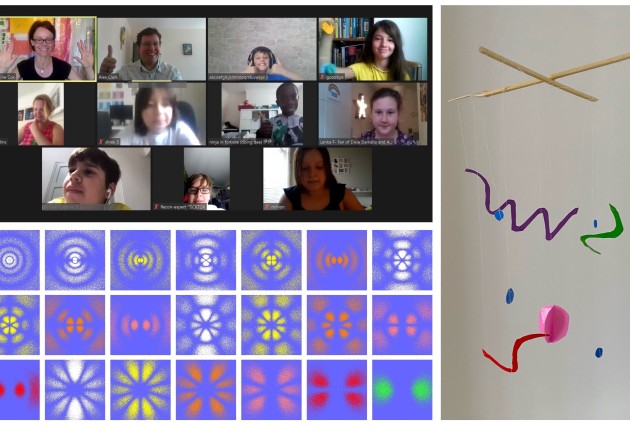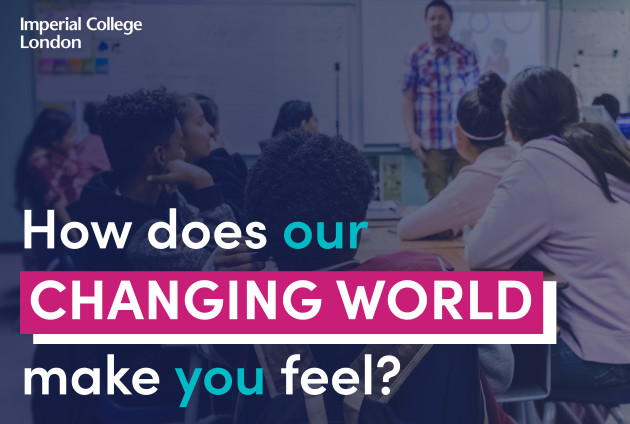Introducing the recipients of the 2020 Rapid Response Seed Fund – this fund was created to support public engagement with research during social distancing. We’re thrilled to be supporting a wide range of public engagement activities, find out more about the different projects below.
ATOM DAY Programme led by Geraldine Cox, Alex Clark and Mike Tarbutt
 For the last two years, the team behind the ATOM DAY programme have been introducing 8-10-year-old children to the beauty of atoms and their intricate interactions with light – brought to life with discussion, art, experiment, poetry and dance. The team have worked with children from diverse schools in London and Durham as well as families at the Invention Rooms. The group will now be taking the project online in a bid to create wider reach and participation for the present and longer term, bringing teachers, families, carers and researchers together.
For the last two years, the team behind the ATOM DAY programme have been introducing 8-10-year-old children to the beauty of atoms and their intricate interactions with light – brought to life with discussion, art, experiment, poetry and dance. The team have worked with children from diverse schools in London and Durham as well as families at the Invention Rooms. The group will now be taking the project online in a bid to create wider reach and participation for the present and longer term, bringing teachers, families, carers and researchers together.
There is scope to engage 100 children in the online sessions. Each mini-programme is for up to 8 children and consists of three interactive workshops and two research-art projects to be completed at home. The sessions are designed to inspire wonder, creativity and curiosity and expand the imagination. The children will develop an understanding of atoms as building blocks, knowledge about the interior world of the atom, and an appreciation of how this is reflected in our everyday world as well as learn about the works of artists Henri Matisse and Alexander Calder.
Longer term the team are planning to train a network of colleagues to deliver Atom Sessions across the UK enabling them to further their reach.
PS-HOME Study led by Dr Sara Garfield
This project is focused on engaging patients and the public in sharing helpful strategies for managing medicines during the Covid-19 pandemic.
The study is exploring if, how and why household medication practices during the Covid-19 pandemic differ from routine practices, and identifying any interventions needed to support medication safety. The team are conducting 50 interviews with those who have been ‘shielding’ or are over the age of 70. The seed fund project will then build on these interviews, involving eight members of the public to engage remotely in the co-design of a list of helpful strategies and activities to share with a wider group of people who are shielding or over 70 and taking long term medication.
The team will disseminate their learnings by providing guidance and recommendations to patients, carers, healthcare professionals and policy makers. The team are expecting two peer reviewed publications to result from this engagement: an evaluation of their approach to remote engagement activities and development of a patient centred classification system for drug related problems. These will be outputs of the NIHR Imperial Patient Safety Translational Research Centre.
Changing Worlds led by Climate Cares
How does a crisis make you feel? There are many common themes in our psychological response; feeling helpless, anxious, guilty, angry, and even fatigued from the constant flow of information. How we process our psychological responses can help us act in a determined, effective and creative way.
 Climate Cares is an interdisciplinary programme of work that aims to understand and support mental health in the current climate and ecological crisis. The first stage involves working with 16-24 year- olds on the co-design of a guided journal to help understand the prevalence, nature and severity of psychological responses to the crises like the pandemic and climate change. The team aim to simultaneously gain insight from young people from diverse backgrounds across the UK to feed into research, as well as co-developing an intervention (the journal and network) to support the participants’ mental wellbeing. Through this study, the team will explore if this tool will allow young people to meaningfully reflect on their psychological response to the current crises in a tangible, accessible and personal way.
Climate Cares is an interdisciplinary programme of work that aims to understand and support mental health in the current climate and ecological crisis. The first stage involves working with 16-24 year- olds on the co-design of a guided journal to help understand the prevalence, nature and severity of psychological responses to the crises like the pandemic and climate change. The team aim to simultaneously gain insight from young people from diverse backgrounds across the UK to feed into research, as well as co-developing an intervention (the journal and network) to support the participants’ mental wellbeing. Through this study, the team will explore if this tool will allow young people to meaningfully reflect on their psychological response to the current crises in a tangible, accessible and personal way.
The Climate Cares team will work closely with Imperial College researchers – in environmental science, public health, climate policy, mental health, behavioural science – to ensure the insights gained from the young people are informing future research questions. The insights will also feed into policy work, led by Dr Neil Jennings at the Grantham Institute. Find out more here: https://climatecares.co.uk and @ClimateCares
Children’s Experiences in Hospital led by Lisa Aufegger & Khanh Ha Bui
Undergoing medical treatment in a hospital can be a daunting experience for young children with long bed days and separation from loved ones. More than 90% of children who are hospitalised show erratic behaviours such as nightmares, temper tantrums, or sensations of stress and anxiety. To date, patient and public involvement, engagement and participation (PPIEP) projects that specifically address young children’s experiences and ideas of improving the healthcare service and delivery for this target population are still limited in scopes.
In light of this, improving children’s experience and understanding of care is the main objective of this project. The team will engage children to reflect on their own hospital care experiences and articulate their thoughts and feelings into words and drawings. Children are then encouraged to translate their experiences into actionable, game-like, engagement activities, through creative storytelling and sketching. Children will be guided to design superhero characters who might help them navigate the challenges of hospital treatment.
The best 10 drawings will be digitalised by the award-winning children’s illustrator Anh Cao, while the best three drawings of characters will be brought to life with a custom-made soft toy. The team hope to gain coverage through the media and to distribute the children’s stories and images in hospitals and share it more widely as part of a published book.
Engaging Communities to Influence Local Transport Related Air Quality Policy Strategies led by Audrey de Nazelle & Gia Pendred
 There is growing evidence that exposure to poor air quality is a key risk factor contributing to the devastating impacts of the COVID-19 pandemic. Many areas local to Imperial College have very poor air quality due to transport related air pollution (TRAP) and are recognised as ‘black spots’ in London, such as those close to the A40 Westway and the Cromwell and Earl’s Court Roads. Affected local communities include many vulnerable groups of people who are socio-economically disadvantaged, living in areas defined as having multiple deprivations which are often associated with low air quality, high levels of poor health and now also some of the worst COVID-19 outcomes.
There is growing evidence that exposure to poor air quality is a key risk factor contributing to the devastating impacts of the COVID-19 pandemic. Many areas local to Imperial College have very poor air quality due to transport related air pollution (TRAP) and are recognised as ‘black spots’ in London, such as those close to the A40 Westway and the Cromwell and Earl’s Court Roads. Affected local communities include many vulnerable groups of people who are socio-economically disadvantaged, living in areas defined as having multiple deprivations which are often associated with low air quality, high levels of poor health and now also some of the worst COVID-19 outcomes.
The team will work with local residents including communities in White City and Earl’s Court to raise awareness about TRAP and about solutions to reduce both contributions and exposures to poor air quality. Participants will have plenty of opportunity to ask questions and will be given links to resources for additional learning, and to live air pollution maps - in order to remain informed about local air pollution and to apply their newfound knowledge in a useful way. The team will also canvas residents about their perspectives on actions that local authorities and policy makers could take or facilitate in order to improve their local air quality.
The results of the group discussions will be collated and fed-back to an audience of policy makers and academics later in 2020 via an Imperial College hosted workshop centred around improving transport related air quality.
Future Geoscientists led by Dr. Kathryn Hadler & Finn Strivens
 Geoscience’s associations with the oil and gas industry have made it less desirable in an age where young people want to have a positive impact on the climate. Imagining possible futures is thought to increase students’ sense of agency over the future.
Geoscience’s associations with the oil and gas industry have made it less desirable in an age where young people want to have a positive impact on the climate. Imagining possible futures is thought to increase students’ sense of agency over the future.
The team led by Dr Hadler will produce a virtual game to connect students with researchers, enable students to imagine diverse futures of geoscience, and position geoscience as a diverse and future-facing subject.
The game is inspired by Situation Lab's "The Thing from the Future" and will involve randomly combining predictions from members of the department to create new ideas for possible futures. Students will discuss the appeal and plausibility of their ideas with a trained geoscientist who will add informative context to these future visions and listen to students’ preferences for their future world.
The student’s ideas and perspectives will be shared with researchers by displaying them on the walls of the department, through a research seminar and through the departmental newsletter. The team also plan on developing the game in to an in-person exhibit for the Great Exhibition Road Festival.
A co-produced qualitative study of the impact of COVID-19 among people living with HIV in the UK led by Jane Bruton and Vas Papageorgiou
COVID-19 has highlighted significant inequalities across society. The project team anticipate that people living with HIV (PLHIV) from lower socioeconomic positions will have been significantly affected by the pandemic; for instance, disruptions to daily life and an impact on their health, wellbeing and HIV care.
This study will build upon an initial community involvement exercise and aims to conduct a community-based participatory research project with PLHIV. In collaboration with the HIV support charity Positively UK, the team will train two peer researchers and two advisory group members with the aim of upskilling the community to lead future research projects. The co-produced qualitative study will involve interviews with PLHIV, conducted and analysed by a member of the research team and/or someone living with HIV.
This work feeds into a larger study aiming to capture the experiences of a variety of sections of the UK population of COVID-19. PERC began interviews with HIV health, social care and community workers in October 2020. The findings and approaches of these two studies – exploring both patients and healthcare workers – will be triangulated and compared to one another.